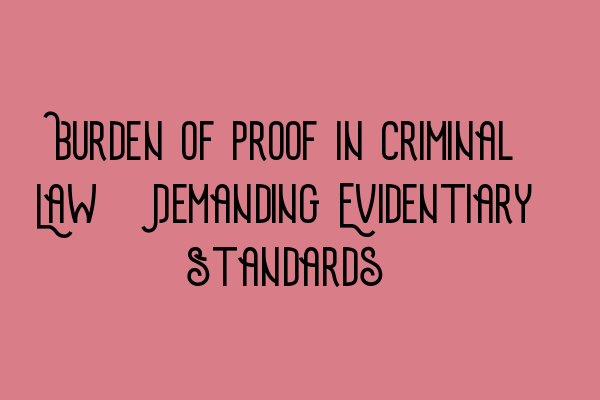Burden of Proof in Criminal Law: Demanding Evidentiary Standards
In criminal law, the burden of proof rests on the prosecution to prove the guilt of the accused beyond a reasonable doubt. This requires the presentation of sufficient and credible evidence to convince the court of the defendant’s guilt.
The demanding evidentiary standards in criminal law serve to protect the rights of the accused and ensure that innocent individuals are not wrongly convicted. It is essential for aspiring solicitors to have a thorough understanding of these standards for successfully navigating criminal law cases.
Proof beyond a reasonable doubt
Proof beyond a reasonable doubt is the highest burden of proof in criminal law. It requires the prosecution to prove every element of the offense with evidence that is highly conclusive and leaves no reasonable doubt in the mind of the court.
This standard recognizes that it is better to let a guilty person go free than to unjustly convict an innocent individual. It places the onus on the prosecution to present compelling evidence that leaves no room for reasonable doubt.
Evidentiary standards
The evidentiary standards in criminal law require the prosecution to present admissible and reliable evidence to establish the guilt of the accused. This includes:
- Direct evidence: Evidence that directly proves a fact without the need for any inference or presumption. For example, an eyewitness testimony.
- Circumstantial evidence: Evidence that indirectly proves a fact through inference or presumption. For example, fingerprints found at the crime scene.
- Expert evidence: Evidence provided by qualified experts in their field to assist the court in understanding complex matters. For example, a forensic scientist explaining DNA analysis results.
- Hearsay evidence: Generally, hearsay evidence is not admissible in court as it is an out-of-court statement offered for the truth of the matter. However, there are exceptions to this rule, such as dying declarations.
Related Articles
For aspiring solicitors who are preparing for the SQE exam, it is important to have access to essential study materials. Check out our article on SQE Exam Prep: Essential Study Materials for Aspiring Solicitors for valuable resources to aid your preparation.
To understand the format of the Solicitors Qualifying Examination (SQE) and what to expect, read our article on Demystifying the Solicitors Qualifying Examination Format.
If you are an international lawyer planning to take the SQE exam, you may face unique challenges. Learn about the strategies for success in our article on SQE Exam for International Lawyers: Challenges and Success Strategies.
For UK entrepreneurs looking to form a Limited Liability Company (LLC), our step-by-step guide on LLC Formation Made Simple: Step-by-Step Guide for UK Entrepreneurs provides valuable insights.
If you want a comprehensive understanding of LLC formation, including legal requirements and necessary steps, refer to our article on LLC Formation: A Step-by-Step Guide for UK Entrepreneurs.
